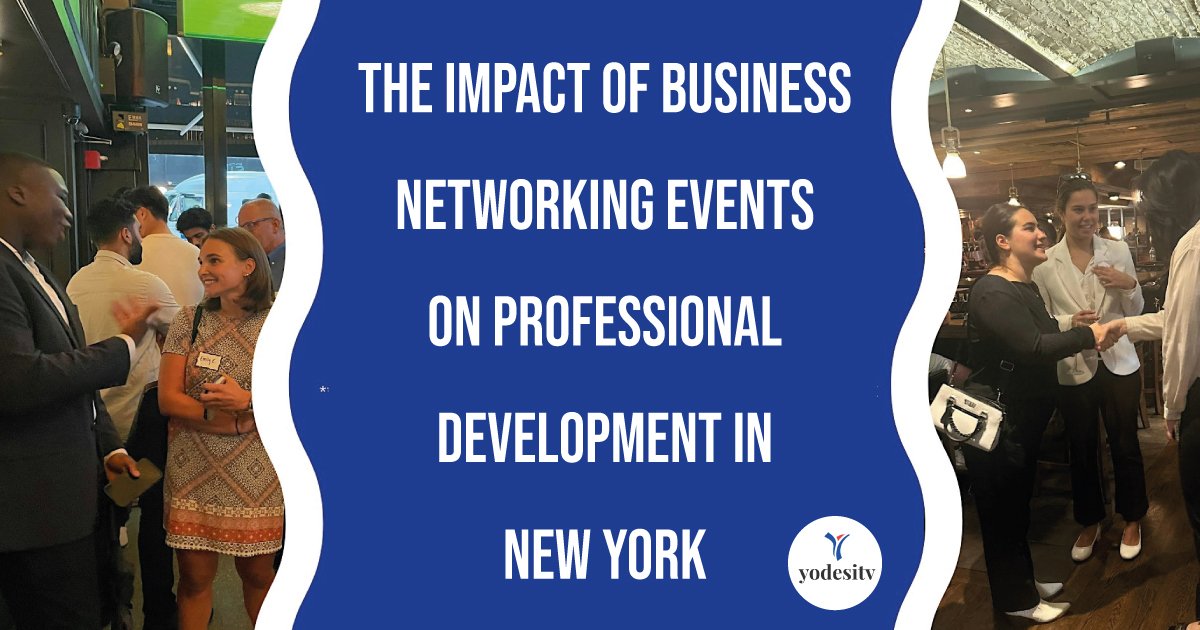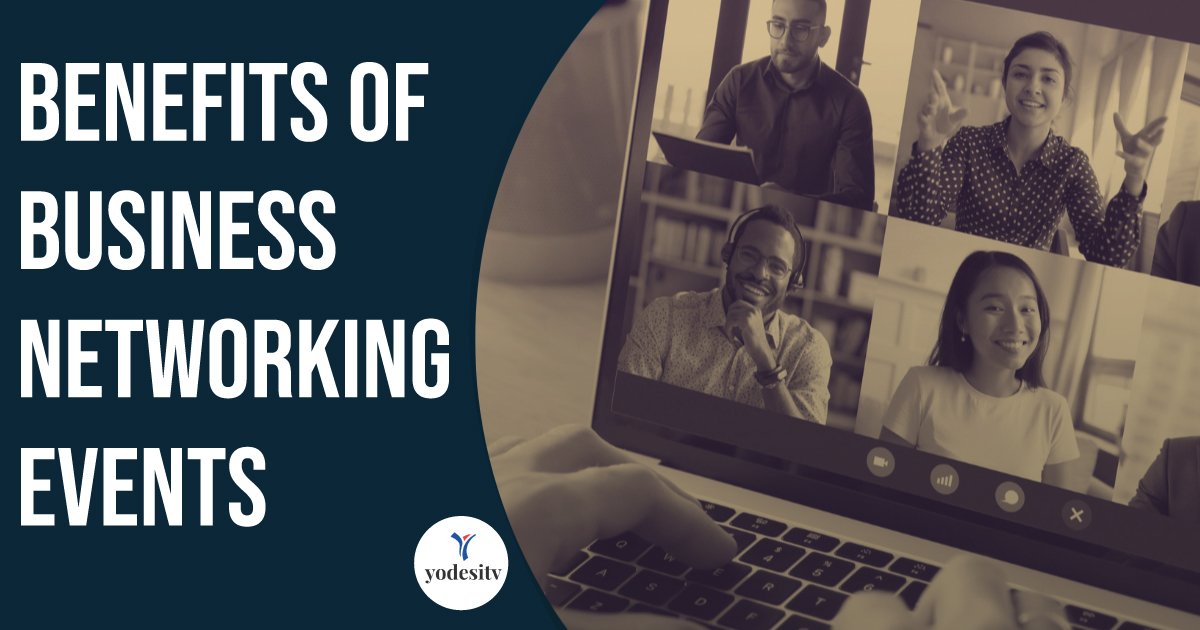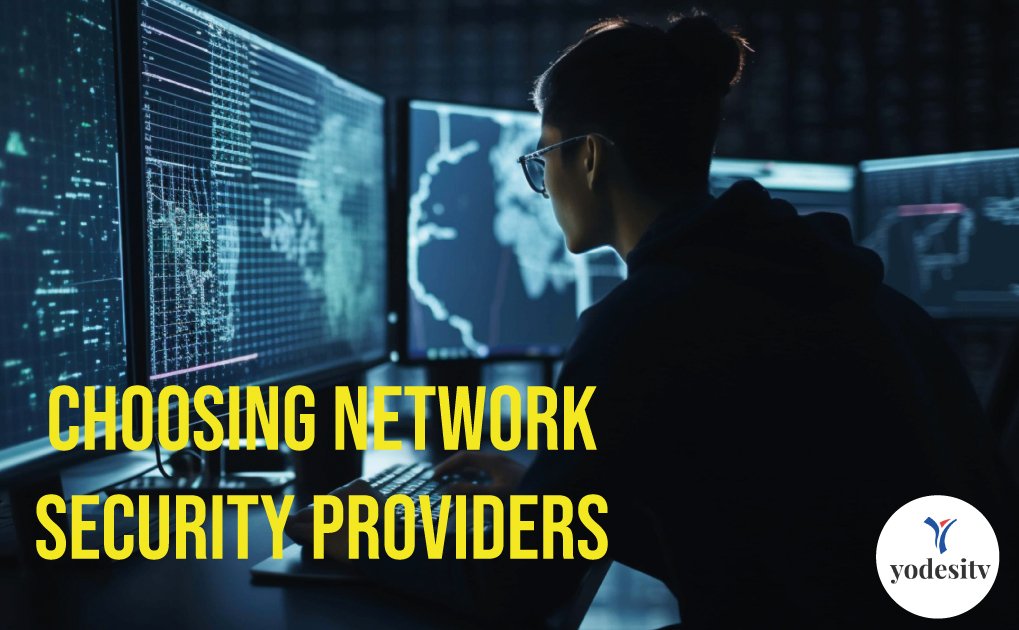Intro
In today’s dynamic business landscape, networking has found its significance in the global business world. Such events have become very important for individuals to connect with other professionals.
Business networking events are beneficial to professionals in order to develop their skills and knowledge, share ideas and information with other professionals from diverse areas or fields, find employment or new opportunities for career growth, and find resources and suppliers for their professional, social, and personal needs. These events are an opportunity to interact informally with a group of people in and outside the interest or concern to develop relationships or friendships to exchange data, experience, and contacts in a professional development context. Currently,
such events are growing due to their potential in helping professionals develop through sharing experiences and the dissemination of information. Weekly events conducted by major professional associations, entrepreneurial, and larger social business organizations or forums in the United States of America are also organized annually.

The events are for-profit for the shareholders while the society members or patrons are mainly professionals interested in developing their academic skills for corporate bodies, including business professionals, investors, educators, lecturers, students, and association members.
The attendees at these events are mainly people interested in or practicing within business and business-related academic disciplines, which include finance, accounting, marketing, and soft skills areas including business communication, people management, education, HRM, OHS, governance, project management, information systems, training and development, and change management. These attract a binary multithreading of participants and present an opportunity to understand the potential benefits of these events to professionals who practice within this wide range of sectors in terms of professional development, networking, and association patrons
. The number of weekly event attendances ranges from 3 in a year to 35 in a year, while the attendance at conferences hosted is 1,162 with a potential of 5,879 attendees from different parts of the United States of America and other parts of the world, depending on the conference being hosted. In addition, other than the interest to network for professionals present at these events, the objective since the inception of these events includes job seekers and entrepreneurs offering the avenue to present their business ideas to interested investors, and putting up their curriculum vitae for interested employers.
The impact of business networking activities, including attendance at these events, on the professional development of individuals is assumed, as the activities predominantly serve members of organizations. The impact of these activities on individuals, including developing one’s career, has not been studied. There is a deficit in how these activities are helping the members in terms of their professional development, such as knowledge transfer. There is also no empirical evidence available in terms of how emerging trends in these networking activities are helping the working population coordinate additional investment in these opportunities.
Background and Significance
New York is home to the grandest civic networking tradition in the United States. The practice has been of keen interest to scholars and economic sociologists for decades. Business networking events share similar characteristics with the power breakfast or the concept of breakfast meetings in the sense that they take place in the morning before the actual business day begins in earnest.
In the current era of the internet and telecommunication, business networking events have gained importance, although their nature and patterns have evolved in varying economic conditions and political scenarios. Despite the changes in the ways of doing business, meeting people continues to be an important part of commercial life. New affiliations lead to new contacts, which lead to potential new sources of employment, introductions, and job opportunities.
In today’s modern, computerized world, some people are losing sight of the important role that networking plays in professional success. An understanding of the characteristics and operations of the New York networking community is of great interest to businesses or individuals who seek to build or sustain the characteristics of a culture that, through interconnectedness, may produce winners. Further, businesses in New York City, with scarce monetary and time resources, might benefit from a close understanding of the dissemination, long-term impact, and operational credentials of events that have a bearing on staff members’ weekday early morning commitment.
Purpose and Scope of the Study
The purpose of this study is to unveil and understand business networking events and link their dynamics with the impact on professional development. As a meta-goal of business networking is to improve professional prospects, we are especially interested in learning if networking events actually have any effect on the professional advancement of the attendee. The study is concerned with social networking at live, in-person events. The primary questions we aim to answer are three interrelated queries regarding how dynamic business networks maintain and spread reliable commerce; the tactics employed in oral and written networking through different types of face-to-face events; and how participants in networking events perceive the “success” of the encounter in terms of career advancement.
The focus is mostly on events in which contacts are public-attendance meetings of mostly strangers approximate in social position, age, and experience. Events take place in New York City in late 2013 and 2014 with a target audience of attendees in their 20s and 30s working in professional sectors. The method for gathering data is to attend events and generically engage with participants. Racial, gender, and job sector were recorded, as well as impressions of the level of professionalism and knowledge of issues intersecting the event content.
The purpose of the present study is to unveil and understand the dynamics of business networking events. Our research, as a consequence, centralizes around three interrelated queries: first, we wish to make an attempt to understand how dynamic business networks maintain and spread reliable commerce and how this is always contingent upon self-branding. We are especially interested in inside advice amalgamated with probabilities of professional potential.
The Concept of Business Networking
Business networking can be loosely defined as collaborating with professionals across various industries, markets, and career paths to meet strategic goals. These goals can pertain to gaining industry insight, sharing leads and client referrals, discussing professional trends, or hiring new talent. Many longstanding business relationships originate from serial networking, where professional connections are made between two strangers. These relationships often evolve, and like all relationships, can advance or stagnate depending on the level of mutual benefit or interest to both parties. A considerable facet of professional development networking centers on creating contacts that can propel one another’s career. A myriad of business networking styles and shared ideals are represented throughout New York.
Networking events in New York City attract professionals from all walks of life and are hosted at unconventional spaces. Moreover, industry-specific organizations and associations also host networking events, seminars, webinars, and conferences that serve one particular demographic or group. Many professional development networks aim to be all-inclusive organizations that invite members of the public for a nominal membership fee or as a value-added component for a steep monthly membership. Due to the size of New York, the city is able to support multiple networking organizations and myriad successful co-working members and event spaces. Casual networking sessions, inter-chamber meet-ups, business expos, and industry-specific tradeshows can also be found throughout New York.
Definition and Importance
Business networking refers to the cultivation and creation of professional relationships. Essentially, it is the act of meeting and using contacts that have been developed to boost knowledge, extend an individual’s network of relationships, generate career opportunities, enhance regular position within a sector or establishment, heighten profile, and achieve excellence within the workplace and the industry.
These interactions are more than mere transactions; they focus on establishing and nurturing long-term professional relationships that may lead to innovative products or services. Networking provides avenues for accessing resources, direct information, and support. It is important in activities such as seeking a job, finding an employee, locating a funding source, rounding up components for a consumer or for an establishment needing potential sales, making new friends, and expanding expertise. Network development is a soft skill and a competency pivotal to career enhancement.
Organizational investments and employer applications indicate the importance of talent within the workplace. In this informal market, for an individual’s career success, the importance of developing a personal brand is crucial as employers want employees invested in the organization. Moreover, organizational loyalty is not as important as performance and assets of an individual within the organization.
Networking is seen as the medium and the meeting point for those seeking job opportunities and those offering the same. Therefore, it is incumbent upon those seeking success in today’s mobile economy—whether freelancers or recent college graduates or committed career professionals—to access networking as a tool towards meeting their career goals and influencing their income.
In the final analysis, maintaining a network is important because human resources are vast within the chain, as well as the inequality in salaries or income of those who have a personal network connection compared to those who only apply for jobs through traditional methods.
Types of Business Networking Events
Business networking events in New York can be classified into two types: formal events and informal events. Formal events are usually prescheduled and require registration to attend. Attendees usually pay registration fees or become sponsors in order to showcase their products or meet potential clients. Trade shows and industry conferences are examples of formal events. Informal events do not require registration and are attended mainly for social exchange. A business mixer is an example of an informal event. These events provide exposure for cross-promotion and cross-referral opportunities.
There are advantages and disadvantages for every type of networking event. For instance, trade shows and industry conferences provide exposure to a variety of participants from a particular industry and can offer exposure to innovation. They also provide information about new goods and services and can offer hands-on experience with new products and services. A business mixer offers a low-pressure social event with entertainment and catering to provide opportunities for socializing. A cross-promotion mixer can help attendees collaborate and reward customer loyalty with value. A breakfast meeting can consist of diverse networking opportunities with small business owners in the local and surrounding areas and offer various topics for discussion and idea sharing.
In conclusion, the various types of networking events in New York may differ in atmosphere, collaboration opportunities, and customer base. Consequently, a new or ardent networker should take part in several functions in order to fully understand the networking landscape and develop a clearer understanding of one’s professional priorities. With a clearer vision, there may be an abundance of opportunities for prosperous networking and making the most of them.
Benefits of Business Networking Events
Business networking events provide a number of professional and personal benefits. The first and most obvious benefit of professional events and networking interactions with people in your industry is the chance to develop skills and abilities. Networking is a main source of mentorship and guidance: find a coach to increase your job skills, identify a sponsor to speed up a career-forwarding new job, or spend time developing a personal board of advisors.
Each one of these mentors can help you refine your strategy in the way that is most helpful to you, as you have discussions not only about your career, but also about how your professional interests interact with activities in your extracurricular life. In addition to the direct development of relevant, growing, or otherwise helpful job skills and abilities, professional development activities and networking provide the chance to learn about trends and developments that directly impact your job function and industry.

As for the relationship-building aspect of these professional events: your network could hold the link to training or professional instruction, with a recommendation. More importantly, when the call for increased collaboration—when workplace silos are breaking down—means that relationships are key to forestalling long-lasting job prospects, it becomes a call for action. A lack of collaboration puts your resources and your job prospects in jeopardy, and professional networking is designed to promote this more innovative way of working.
You may know a lot about a particular topic, but that doesn’t mean you’re armed with the latest trends, analysis, or best practices. A professional meeting may dispense the best knowledge on an issue as it has the latest perspective. A project manager could have some great ideas, but it’s the tech setting up the customizable scheduling you need to pilot the project. If you can provide the same strategic value, then it’s this sharing that fosters innovation, smarter project management, and your value to your employer.
Professional Growth and Development
Professional Growth. Networking events can be spaces for obtaining unique knowledge, resources, and insights. In attending these events, participants have the potential to gain new technical knowledge, new strategies for doing work, and new resources for completing tasks, expanding knowledge, and improving overall work performance. Substantive knowledge and skill sets that can be directly used in the participant’s daily workflow or practice are a central focus of professional learning.
One useful aspect of professional learning includes proactive strategies, which are those in which participants actively seek out information, learning about various topics that are related to their own business or to learn new skills they are likely to use in their future. In addition to substantive knowledge, social learning in the form of motivation to work harder and learn more can also occur.
Another side to this form of professional learning can be the ability to gain strategic inspiration or insights from peers and industry leaders. Not only can the people obtained through networking provide information and resources, but they can also provide inspiration. Inspirational learning can come from learning about the attitudes, characteristics, or strategic plans of similar actors. These actors can either act as a cautionary tale or provide an example to be emulated.
One of the most obvious advantages of networking is the ability to raise your professional visibility and reputation, which can then, in turn, improve rapid career advancement. Networking can provide business colleagues with the opportunity to gather and share best practices or discuss how they manage their work. Many other strategies for networking events recommend learning anything and everything possible.
The more high-value skills you have and the more competitive your portfolio looks, the easier it is to make your career transition. Because networking has strengths, it can be a trigger into a new position that is worth more effort in networking than completing an uninspiring application. Not everybody is networked into their next position during networking events, but it shows that those who do have significant gains in earnings and position. It is also the most important workplace skill in long-standing career success when it comes to lifelong growth and prosperity.
Opportunities for Collaboration
Networking events present an essential means of facilitating opportunities for collaboration among attendees. As a result, partnership building proves to be one of the most cited motivators for professionals to take part in such events. In joining an event, attendees may find potential collaborators with expertise or resources in areas closely or even remotely related to their own unique areas of expertise. Upon doing so, partnerships with such connections can spawn fresh opportunities for innovation.
Where little to no overlap exists between offerings or services, networking events offer themselves as a solution for locating those with required knowledge in entirely novel fields. Consequently, positive returns can be expected from such meetings, with entrepreneurs utilizing networking events offering unexpected potential returns through resource sharing, taking the form of resource sharing with professionals with adjacent expertise to that exhibited by the event-goers themselves.
Importantly, events surrounding professional proceedings can be expected to operationalize this in some capacity. Particularly, for large events, the popularity of networking for attendees makes it more likely for a fortuitous connection to be formed, albeit one that is deprioritized by the professional expectations cultivated by the event.
Indeed, many high-profile collaborations have been established through professional networking events. Take, for instance, the story of three freelancers who met at a media lab demo and proceeded to found a maker of portable turntables, or the tale of a theater creator being introduced to potential stakeholders for her upcoming show at a creative engagements event she was only enabled to attend as a result of free entry self-sponsoring. Sometimes, an event will openly promote its collaborative benefits, serving to heighten the level of networking behavior during proceedings.
Indeed, it was clear to see that this was the case at the aforementioned creative engagements event held at a performing arts center. Potential project partners were deliberately seated together over dinner while event holders openly declared their intention to foster collaboration between artists and local communities. Alternatively, the potential for collaboration may not be so clear-cut, but significant nonetheless, often leading to the creation of lasting partnerships. For instance, a nascent relationship may be the basis for a future strategic alliance, with parties on great terms and benefiting from a cordial after-event coffee.
Challenges and Strategies in Business Networking
made any connections. However, taking the time to prepare can significantly enhance your experience. Start by researching the event and its attendees, setting specific goals for what you want to achieve, and practicing your introduction. Consider bringing conversation starters or questions to engage others. Arriving early can also help you acclimate to the environment and meet people before the crowd builds.
During the event, focus on quality over quantity. It’s more beneficial to have a few meaningful conversations than to try to meet everyone in the room. Listen actively and show genuine interest in others. This can help ease your anxiety and make interactions feel more natural. Remember that many attendees may also feel nervous, so you’re not alone in your feelings.
After the event, follow up with the people you connected with. A simple message expressing your enjoyment of the conversation can go a long way in building relationships. Networking is not just about making contacts; it’s about nurturing those connections over time. With practice and the right mindset, introverts can thrive in networking situations and create valuable professional relationships.
Overcoming Introversion and Shyness
Many people find it difficult to introduce themselves to others, especially if they are shy by nature. They feel uncomfortable being around new people, especially those in leadership or possibly a mentor position. They believe that getting to know them would be of enormous help for them and their careers, whether currently a student or in business fields. The truth is that more people are introverted on the surface. These examples are common in both business and during networking events. Do not fear; we will help guide you step by step through the networking process to non-stressful occasions.
1. Start with small talk – It is the same at the bank teller or the post office. They ask you briefly how things are before they proceed with their service. 2. Prepare for the event – Understand the layout, agenda, and content, and prepare for who may be at the networking event. 3. A positive attitude goes a long way. 4. Try not to let anxiety conquer you. Try breathing exercises to calm yourself.
The task of shyness can put a terrible spin on getting to know people during networking sessions. Conquering these challenges could be one of the most beneficial actions you take. A positive outcome could be: 1. Build closer relationships. 2. Increase your networking well of connections, which are beneficial for finding people for problem-solving situations during business!
Building Authentic Connections
At a basic level, value is derived from actions that are taken to support a relationship. It is important to take the time to really get to know people. When embarking on an interaction, participants are encouraged to come with an awareness of the importance of an authentic approach to networking. The way of being with others should be free of any kind of transactional element and based on the elements of trust and accountability. Not only does it transform the way an individual is seen, but it enhances the overall quality of living.
One of the ways to deepen relationships is considered to be deep listening. Active listening is a signal that the individual is not only listening but also understanding. It is as much about the words as it is about the actions. Empathy is the next step from active listening. When an individual is able to provide empathy as a response to another’s problems, they are showing that they are capable of understanding. A last level of value co-creation is also unlocking potential through association. Individuals are encouraged to listen with their heart and with sufficient vulnerability and openness for an authentic connection to occur.
This connective tissue can lead to the establishment of an authentic professional relationship if carried further in a vital, timely follow-up. The follow-up helps you re-enter the safe circle – the establishment of a friendship – and makes the encounter beneficial even if it wasn’t personally fruitful. These close personal friendships can last forever, but come from investing time and letting your guard down. Setting up this expectation deals mainly with a shift in attitude at each end of the spectrum, with the person actually doing the work and everyone else present lending support; thus creating a culture of mutual responsibility.
Conclusion and Future Directions
In this study, we conducted an empirical examination to understand the extent to which business networking events can impact professional development in New York City. Key takeaways from the study include the following findings. In our sample of 100 networking event regulars, an overwhelming majority (90%) of them reported that they believe networking can help with their professional success.
The networking professionals who believe networking can help with professional success look similar to those who are less certain about the advantages of networking; neither the professional nor social characteristics we asked about differ between the two groups. In an attempt to learn more about networking habits among the 133 participants, we asked them if and how often they send invitations to another member of the networking organization to meet up again. A majority, 71%, reported doing this, and one in four (25%) members reported doing this “almost always”.
Our findings indicate that networking is an important practice in these early years of the twenty-first century—arguably into the fourth era of the industrial revolution and in the nascent movement towards the fifth industrial era. Indeed, psychologists assert that one in five people in the world faces networking anxiety, and one in ten people avoid networking events altogether. We believe much more research is required in this area, and we are working on a paper about the role of networking and how it is now probably more critical than ever.
5.2 Future Directions
Our findings indicate the potential of using networking communities for support in personal and professional life. We believe this raises a number of questions for future research: 1. What are the significant benefits of belonging to a particular networking community, and does this change over time? 2. Do networking opportunities change over the lifecycle events of an individual? 3. Is the practice of networking the same for different generations? 4.
How will digital engagement change demographics in networking? Finally, businesses and organizations could also benefit from further research into this area. Given the potential changes to career trajectory, it is important to research how to curate the right experiences. Companies need to consider the continuous horizons that will be required to keep their workforce aligned with their constant pivoting of direction. How to align career direction with enterprise direction is now the challenge for human resources and learning and talent development.


